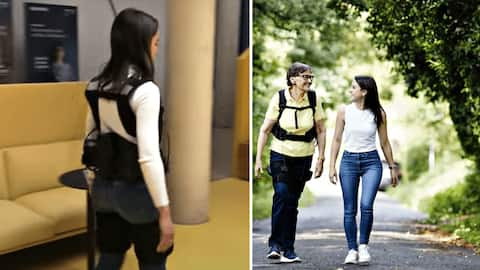These robotic shorts make walking a breeze for senior citizens
What's the story
Researchers at the Technical University of Munich (TUM) have developed a pair of robotic shorts, called WalkON, to make walking and jogging easier for senior citizens. The innovative device works by assisting hip flexion and reducing the energy required for these activities. Individuals using WalkON for a 500-meter uphill walk experienced an 18% reduction in metabolic cost compared to unaided walking, the study published in Nature Machine Intelligence said.
Technological innovation
A technological breakthrough for mobility
WalkON is a lightweight, compact system that employs a tendon-driven design. It works with a controller rooted in natural leg movements to autonomously assist leg propagation. "We have developed a system that makes people want to move around more. It's the same concept as the electric bike, but for walking," TUM Professor Lorenzio Masia said. The device can be worn and used without any pre-settings, offering a plug-and-play experience for users.
Efficiency enhancement
Impact on daily walking and energy expenditure
The TUM team first tested WalkON's effect on daily walking with young adults on a difficult outdoor uphill 500-meter hiking trail. The outcome was a remarkable 17.79% reduction in the metabolic cost of transport for these people during uphill walking. Subsequently, they confirmed their results with older adults walking on a flat outdoor 400-meter track, where WalkON cut their metabolic cost by 10.48%.
User adaptability
WalkON adapts to individual movement and weight
WalkON is designed to detect how fast a user is moving and adjust to the weight of their legs, offering customized support. Study participants reported high perceived control over their voluntary movements (self-reported mean score of 6.20 out of 7 on a Likert scale). Even older adults retained a strong sense of movement control (mean score of 6.09 out of 7) while using WalkON on level ground.
Health benefits
Potential to improve physical well-being
The researchers emphasized the potential of wearable assistive devices such as WalkON to improve efficiency in outdoor walking. They said this could have promising implications for encouraging physical well-being and improving mobility, especially in the later stages of life. Professor Masia further stressed that walking helps people improve their metabolism, which could positively affect their health conditions and overall quality of life.
